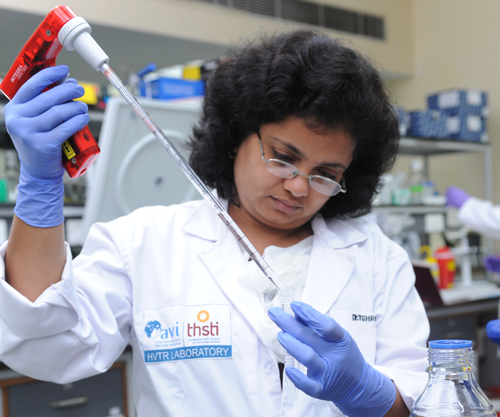March 18, 2019
Year of Progress Highlights Need for TB Vaccine Research Support
World TB Day falls on March 24 each year. It marks the day in 1882 when Robert Koch announced that he had identified the cause of TB.

By Ann Ginsberg, M.D., Ph.D., Senior Technical Adviser, IAVI
This World TB Day, March 24, provides an opportunity to reflect on the remarkable progress that has recently been made on the tuberculosis (TB) prevention research front and to draw attention to the implications of those results for the future of TB research and funding.
In September 2018, as described here, the pharmaceutical company GSK and their partner, not-for-profit product development organization Aeras (now part of IAVI), announced that the TB vaccine candidate M72/AS01E1 was 54 percent effective at preventing active TB disease in trial volunteers with latent TB infection (p=0.04). The vaccine candidate also had an acceptable safety and reactogenicity profile. Study results were published in the New England Journal of Medicine (N. Engl. J. Med. 2018; 379:1621-1634), along with an editorial by Barry R. Bloom, Ph.D., describing the importance of the trial findings (N. Engl. J. Med. 2018; 379:1672-1674).
These prevention of disease results were especially encouraging because they suggest this vaccine candidate, by preventing disease symptoms that spread TB bacteria (Mtb) to others, may also have the promise to reduce TB transmission. A vaccine that decreases TB disease in already Mtb-infected adolescents and adults would have the fastest impact on controlling the global TB epidemic (Hum. Vaccin. Immunother. 2016; 12:2813-2832).
Other significant trial results in 2018 came from an investigation of revaccination with BCG, the nearly 100-year old vaccine that is the only licensed TB vaccine. In this trial, Mtb-uninfected adolescents who had received BCG as infants (as most infants do in high TB burden countries) were revaccinated; results showed that recipients had a reduced rate of sustained Mtb infection, as measured by a standard test. The results of this trial were published in the New England Journal of Medicine in July 2018 (N. Engl. J. Med. 2018; 379:138-149).
This re-purposing of the existing vaccine may be a relatively fast way to bridge the gap between the present, when TB is still the top killer due to a single infectious agent, and the future, when novel vaccine candidates with even greater ability to prevent TB in all the populations at risk will be licensed and available. In this optimistic future, TB will no longer be a global public health emergency. The ground-breaking results from 2018 should provide the impetus to significantly accelerate TB vaccine research and development (R&D) and to devote ourselves to addressing crucial gaps in the clinical research landscape.
TB vaccine R&D, unfortunately, has been severely under-resourced for many decades. At the 2018 United Nations High-Level Meeting to End TB, global leaders noted that there is an annual $1.3 billion funding gap for TB R&D. Leaders at the meeting made a forceful call for all countries to increase their funding commitments to TB, including to vaccine R&D. Countries must answer the U.N.’s challenge so that trial results such as the ones described here are translated as quickly as possible into products that reach the populations that need them.
In parallel to accelerating progress to access for the most promising vaccine candidates, increased funding should accelerate basic and translational research. For example, we must expand our only partial understanding of protective human immune response to TB and address the absence of a validated predictive animal model or correlate(s) of protection. Advances in these areas would help researchers quickly and cost-effectively predict which vaccine candidates are most promising. The data and stored biological samples from the two proof-of-concept trials described above provide an unprecedented opportunity to tackle these urgent needs.
Other technical challenges will also benefit from increased funding:
- Efficacy data generated in TB vaccine candidate proof-of-concept studies has necessarily been limited to studies in narrow and specific populations (for example, HIV-negative adults with evidence of prior Mtb infection recruited from sub-Saharan Africa). Now we need to evaluate TB vaccines in broader populations, such as individuals of younger and older ages, those living in different geographies, individuals who have not previously been infected with Mtb, and HIV-positive individuals.
- Understanding the epidemiology of TB is essential. Identifying populations at high risk of TB allows us to determine appropriate areas for TB vaccine clinical trials and to design appropriate studies that most efficiently provide us with robust outcomes for decision making. Data generated in such studies will also provide the basis for modelling the impact of these and future interventions and planning for their eventual implementation.
- The current pipeline of clinical TB vaccine candidates contains limited antigenic and immunological diversity. We must broaden the diversity of vaccine-induced immune responses by evaluating innovative and emerging platforms and approaches, including nucleic acid vector approaches, antibody-mediated protection, novel protein-adjuvant combinations, and alternate delivery modes, such as mucosal administration.
IAVI is working with partners across the product development spectrum to answer many of these key questions and to address crucial challenges in TB vaccine research. Moreover, we and others are engaging now with endemic countries to begin preparing for eventual adoption and implementation of new vaccines. With the exciting progress achieved in 2018, we must work together to forge novel, creative, and extensive collaborations that will support not only accelerated R&D progress but ensure that novel, safe, and effective TB vaccines are adopted and delivered globally to those at risk.
We hope 2019 brings even more advances in TB prevention research and that on World TB Day 2020, we are closer to our common goal of ending the global TB crisis.
1The GSK proprietary AS01 adjuvant system contains QS-21 Stimulon® adjuvant licensed from Antigenics LLC, a wholly owned subsidiary of Agenus Inc. (NASDAQ: AGEN), MPL and liposomes.